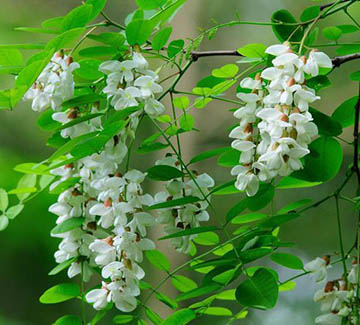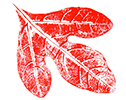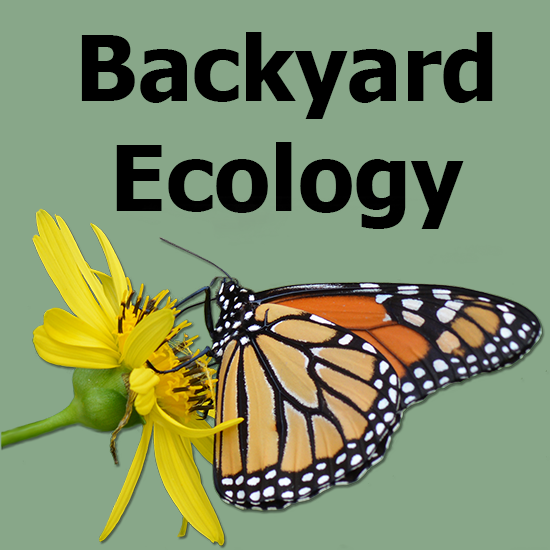Black locusts (Robinia pseudoacacia) are tall trees native to the Appalachian region and parts of the Ozarks, but they have been widely planted across the U.S. and in parts of Canada. They have even been imported to other parts of the world where they are often planted as ornamentals. Black locusts grow very quickly but are considered relatively short-lived because they rarely reach 100 years old. The wood is very strong and was commonly used as fence posts which is one reason why it was planted so frequently in historic times.

The flowers form in cascades of medium-sized white flowers. In a good year when they are in full bloom, black locusts can look like the outer limbs are piled with snow, except that it is way too warm for snow. The individual black locust flowers are shaped like the flower of a pea. There is a good reason for that – it is in the same family of plants as the pea. Like peas and beans, black locusts are considered nitrogen fixers and have bacteria associated with their roots that improve the nitrogen levels in the surrounding soil.
The white flowers of the black locust have a sweet smell and produce abundant amounts of nectar and pollen. In Kentucky, they primarily bloom in late April and early May. The exact timing of the bloom depends partially on where you are located in the state and what the weather has been like.
Black locust flowers are a favorite spring flower for pollinators, especially honey bees and many species of native bees. Beekeepers in this area are especially fond of black locust trees because black locusts are often one of the primary sources of honey that can be harvested in the spring. It’s important to note that the black locust (Robinia pseudoacacia) is not the same tree as the honey locust (Gleditisia triacanthos). Despite its name, the honey locust doesn’t result in as much honey production as the black locust.
In addition to honey bees and native bees, hummingbirds and many species of butterflies and moths also visit black locust flowers. Black locust trees are also important host plants for many caterpillar species including that of the silver-spotted skipper (Epargyreus clarus) and the clouded sulphur (Colias philodice). The caterpillars don’t visit the flowers, but instead eat the leaves before undergoing metamorphosis into a butterfly or moth.
Black locusts are also valuable to many other wildlife species. Many species of songbirds make their homes in the branches or eat the caterpillars and other insects that feed upon the leaves. White-tailed deer, rabbits, squirrels, and some of our larger birds like quail and turkey have all been known to eat black locust foliage or seed pods. However, care should be taken with livestock around black locust because many sources report that it can be toxic to livestock.
While they may not be as well-known as some other types of trees such as oaks and maples, black locusts are a valuable part of our forest ecosystems. They provide food and homes for pollinators and other wildlife species throughout the year.

This article was part of Shannon’s original Kentucky Pollinators and Backyard Wildlife blog which evolved into the blog for Backyard Ecology.

Backyard Ecology: Exploring Nature in Your Backyard
Nature isn’t just “out there.” It’s all around us, including right outside our doors. Hi, my name is Shannon Trimboli, and I am the host of Backyard Ecology. I live in southcentral Kentucky and am a wildlife biologist, educator, author, beekeeper, and owner of a nursery specializing in plants for pollinators and wildlife conservation. I invite you to join me as we ignite our curiosity and natural wonder, explore our yards and communities, and improve our local pollinator and wildlife habitat. Learn more or subscribe to my email list at www.backyardecology.net.

Leave a Reply